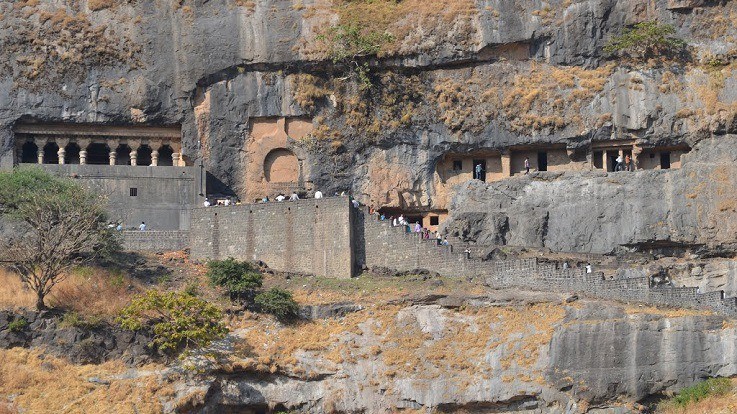Girijatmaj Temple in Lenyadri, Pune district, is dedicated to Lord Ganesha as Girijatmaj. Covering roughly 1 acre, it’s the sixth temple to be visited during the Asthavinayak yatra. It is set in a cave on a hill near the Kukdi River, about 90 km from Pune drawing devotees from across India. It is the only temple of the Ashtavinayakas which is on a mountain and is built in the locale of Buddhist Cave.
Historical Overview
The Girijatmaj Temple has ancient origins, dating to the 1st century CE, though some suggest worship began earlier. Lenyadri, a quiet village 90 km from Pune, was a spiritual spot. Old texts and local talk suggest the temple was carved into a Buddhist cave complex, later dedicated to Ganesha by devotees. The Peshwas, Maratha rulers who revered Ganesha, added structures and paths in the 1700s, as stone writings show. The temple faced damage during invasions in the 1600s, but the cave setting protected the Ganesha idol. It was restored in the 1800s with help from local chieftains. From the 1900s, the Endowments Department maintained its sanctity, keeping its old charm. Today, it stands as a beacon of strong faith, drawing devotees and wanderers.
Mythological Importance
The temple is for Lord Ganesha, believed to grant purity and devotion. His idol, carved directly into the cave wall from black stone, shows him in a simple form, standing for divine protection and spiritual clarity. These caves are also known as Ganesh Gufa. It is believed that Devi Parvati performed penance to beget Ganesha at this place. Girija is another name for Devi Parvati and ‘Atamaj’ means ‘Son’. Thus Ganesha is worshipped as Girijatmaj, his child manifestation in this temple. Another tale from the Mudgala Purana says Ganesha manifested in the cave to bless his devotees in the area. The murti, believed to be self-manifested, holds divine power, granting serenity to those who pray with faith. In the Ganapatya sect, saints like Morya Gosavi are said to have meditated here, attaining great spiritual height.
Temple Structure and Design
The Girijatmaj Temple in Lenyadri, Maharashtra, is unique, carved into a rock-cut cave from the Buddhist era, blending devotion with the hill’s rugged beauty. The temple sits within one of 30 caves on a hill, reached by climbing 283 stone steps. The cave entrance, restored in the 1800s, features simple stone carvings of Ganesha with his trunk raised, lotuses, and vines, framed by natural rock. Painted in soft ochre, it blends with the cave’s earthy tones. The sanctum, deep inside the cave, houses a black-stone Ganesha idol, carved into the rock wall, draped in gold cloth and fresh garlands. The cave’s natural ceiling, smoothed by time, carries faint Buddhist-era etchings, glowing under oil lamps.
Small shrines for Shiva, Parvati, and Hanuman are scattered outside the cave, each carved from local basalt and sheltered by open stone canopies. The Shiva shrine, near the steps, holds a small lingam, its base etched with snake motifs. The Parvati shrine, by the hilltop, shows a gentle goddess with a lotus, inviting prayers for peace. The Hanuman shrine, facing the cave, depicts him kneeling, hands folded in devotion. These shrines, though modest, tie the temple’s worship together, offering varied paths to faith.
Set near the Kukdi River, the temple is reached by a steep climb from Lenyadri village, winding past neem and peepal trees. The hilltop courtyard, paved with uneven stone, feels open yet sacred, fringed by shrubs and small trees that cast dappled shade. A small tank, fed by a natural spring, is used for ritual dips, its edges worn by time. The cave’s rock walls have niches for Naga figures, believed to protect the grounds.
Carvings near the cave entrance tell Ganesha’s tales—his birth, his bond with Parvati, and his love for modaks—etched with care to guide devotees. The temple’s build centers on worship, with every rock and carving pointing to Ganesha’s grace. The 1900s fixes added sturdy steps but kept the cave’s sanctity and divine space intact, making it a quiet spot for prayer and peace.
Rituals and Festivals
The temple celebrates festivals dedicated to Ganesha. Among them, Ganesh Chaturthi in August or September is the biggest one. Magh Shukla Chaturthi in January or February has homams (fire rituals) and idol worship. Sankashti Chaturthi, every month, sees lamp-lighting by the sanctum. Daily worship covers Suprabhata Seva (morning prayers), Archana (offerings), and Deeparadhana (lamp ritual). Services like Abhishekam and Ganapati Homam can be booked at the temple office. A prasad stall gives free laddoos for devotees. Modak Archana, giving sweets on Wednesdays, is for clear minds.
How to Get There:
Air: Pune International Airport, 90 km away, is nearest. Taxis take 2 hours, costing 2000-3000 rupees.
Train: Junnar Railway Station, 15 km away, links to Pune (1 hour) and Mumbai (3 hours). Autos to Lenyadri cost 200-400 rupees.
Road: Lenyadri is 90 km from Pune. Buses from Pune’s Shivajinagar Bus Stand (2 hours) stop at Lenyadri village, 1 km away. Autos cost 20-40 rupees.
Best Time to Visit: October to March has good weather, 20-30°C. Weekdays are calm. Ganesh Chaturthi packs crowds, so book early.
Nearby Attractions: Chintamani Temple, 70 km away in Theur, is the sixth Ashtavinayak stop. Shivneri Fort, 10 km away, is Shivaji’s birthplace. Ozar, 20 km away, hosts the Vighneshwar Ashtavinayak temple.











